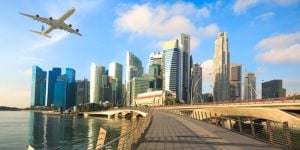getting permanent residency/citizenship and surviving financially
Last activity 07 November 2018 by misterinternational
1125 Views
22 replies
Subscribe to the topic
Post new topic
hi,
i'm an abc (american born chinese). i speak english fluently, as you can see, and i know a tiny bit of mandarin.
i have a bachelor's degree in psychology. basically i don't have any useful skills.
i currently make $62,000 us dollars a year.
i have a few questions:
1. what are my chances of getting permanent residency or citizenship in singapore?
2. what are my chances of getting a job in singapore?
3. what are my chances of surviving financially in singapore?
thanks
I disagree to your view that psychology is a useless skill.
1. While it is possible to apply for Permanent Residence (PR) after just 6 months living and working in the country, the chances of being approved are very low before you have been here for three years.
The waiting time to become citizen is several years longer.
2. This depends on your skills, education, work experience and the status of the local labour market in your field - it is not possible to make a statement based on the very limited information you gave.
3. This depends entirely on the salary you will get and what your spending habits are, so also impossible for us to judge.
i am currently an appraiser, but my appraisal certification only allows me to work in new york state (in america), so my certification would be useless in singapore.
since i only have a bachelor's degree in psychology, if i moved to singapore, i would basically have to find an entry level job.
i am pretty frugal, although i do eat out for lunch and dinner every day.
i'm just trying to find out if i have a realistic chance at getting permanent residency/citizenship and a decent job in singapore before spending more time and energy researching singapore.
As Beppi already informed that you need to work for couple of years before even thinking of getting PR. There are several criteria before ICA approves PR. So, if you think that you just came and apply PR then will get. I must say that doesn’t happen here, unless you are bringing $100mil or you are prominent Sports person or a scientist then it would be easier to get a PR within few months of your arrival.
To get a job opportunity, you need to visit a thread where I had shared top 10 job portals to check how’s the job market in your specialisation. There is no thumb rules to get a job here. It’s a highly competitive market, so it wouldn’t be an easy process to find a job. Good luck
a few more questions:
1. my understanding is that this is the process for getting permanent residency/citizenship: first, find a job, which allows you to get a work visa (which lets you stay in singapore for an extended period), and then second, after working in singapore for a few years, then you can get permanent residency/citizenship? is that the correct process?
2. i know that surya2k already said that it's hard to find a job. does anyone else have any input about how hard it would be for me to get a job in singapore?
thanks
To response your queries, see below response:
1. If you read my first response, you will come to know that you must have a job, stay here then contribute to the society, pay taxes, before you apply PR. Whether you will get a PR, it’s a different question as there are several yardsticks have to go through.
Or else bring $100m (there is no such fixed amount) or you must be a well known scientist or sportsman then you can get PR without going through the above criteria.
2. Did you read my thread where I have given 10 popular portals to check the job opportunity in your field.
You should accumulate your strengths, experiences and demand of your work experience in Singapore, then you will get answer.
Another path to getting a PR is marrying a Singaporean.
(Maybe easier than accumulating millions of dollars or becoming a world-known acientist, artist or sportsman.)
This path is difficult now. Thousands of married couples in Singapore are in dilemma after his or her partner who is a foreigner not able to get LTVP or LTVP+.
ICA knows this loophole and taking appropriate measurements on this. So, it’s no longer an easy way too. Unless his or her Singaporean partner is established and earning a good salary, where chances of getting LTVP will be easier.
Oh, I didn't know that becoming PR due to family ties is also getting more difficult. Thanks for the update!
"1. If you read my first response, you will come to know that you must have a job, stay here then contribute to the society, pay taxes, before you apply PR. Whether you will get a PR, it’s a different question as there are several yardsticks have to go through."
what kind of "yardsticks" are there?
yes, i read your thread about the 10 job portals.
thanks
If you google it, then you must have come to know.
1. Here, it works on race basis (Chinese 71 to 72%, Malay 11%, Indian 8%, rest distributes other races). Govt doesn’t change this ratio when distributing PRs and Citizens.
2. Secondly, duration of staying in Singapore before you are applying for PR. Normally, someone can consider applying after 6months but it only counts when you have at least 2 to 3yrs or so.
3. Your contribution towards society.
4. Skills set in your job profile and it’s demand & supply in Singapore.
5. Your commitment for longer stays in Singapore.
6. Financial stability
7. Past records
8. Family bonding, if you have male children then will get advantage, as they will be sending National Service once they reach 18yrs old.
And so on......
ok.
i'm chinese, so that helps in point 1, but my lack of job skills would hurt me for points 3, 4, and 6.
it sounds like it would be pretty tough to get a job in singapore, but we'll see what the future brings.
thanks
Yes, Chinese descendants have higher possibility (if you are a Malaysian Chinese, chances are very high. Similarly, Malaysian Malay and Malaysian Indians have much higher possibility to get PR).
It’s true, in compare to other community, your chances are higher but other conditions also have major roles before distributing PR including job security is must. Good luck
2 more questions:
1. so in terms of finding a job, how long am i allowed to stay in singapore to look for a job if i'm just there by myself searching?
2. can you get a work visa for doing low-skilled jobs, like working at a bookstore or working at a restaurant? i would imagine that singaporean employers would only give those low-skilled jobs to singaporean citizens, i would imagine that singaporean employers would only be willing to get a work visa for highly skilled foreigners (like engineers, doctors, computer programmers, etc.)who have job skills that native singaporeans do not have. do you agree?
misterinternational wrote:1. so in terms of finding a job, how long am i allowed to stay in singapore to look for a job if i'm just there by myself searching?
You can get a normal visit visa (SVP) for 30 days. This can be extended to 89 days if you have a legitimate reason to stay that long. Job search is not counted as legitimate reason.
misterinternational wrote:2. can you get a work visa for doing low-skilled jobs, like working at a bookstore or working at a restaurant? i would imagine that singaporean employers would only give those low-skilled jobs to singaporean citizens, i would imagine that singaporean employers would only be willing to get a work visa for highly skilled foreigners (like engineers, doctors, computer programmers, etc.)who have job skills that native singaporeans do not have. do you agree?
Singapore has a shortage of highly skilled professionals (who get an EP) as well as manual labour (who get a WP and must be from certain approved source countries) - because Singaporeans don't want to do such jobs any more. Between these two, it is more difficult, but still possible if there is a specific shortage of manpower for the job in question. Most of these get S-Pass.
"Between these two, it is more difficult, but still possible if there is a specific shortage of manpower for the job in question. Most of these get S-Pass."
are you referring to the low-skilled jobs or the high-skilled jobs?
I meant in-between, middle skilled jobs.
There are, at all levels, measures in place to make sure locals are preferentially hired (if there are any suitable ones), but in the medium level they are the strongest.
how easy is it to get a work permit for a manual labor job if you are from the U.S.?
seems like it would be very challenging to get a job, since i could only visit for 30 days.
thanks
misterinternational wrote:how easy is it to get a work permit for a manual labor job if you are from the U.S.?
Impossible. See my remark about approved source countries for WP above - USA is not one of them.
misterinternational wrote:seems like it would be very challenging to get a job, since i could only visit for 30 days.
If you start contacting relevant potentials employers in advance and come only for the interviews, it might be possible. You'd have to leave again during the processing of your visa (which takes more than a months in most cases). Waiting for work pass approval only sometimes works as reasion for an SVP extension ...
But even if you max' your SVP and stay 89 days, there is no guarantee you find a job. Better come with a Plan B.
thanks
beppi,
"Better come with a Plan B."
thanks, i appreciate when people explain things straight like this.
can you give some examples of what are high-skilled, middle skilled, and low skilled jobs?
where would a book store employee or a restaurant employee fit in this scale?
thanks
High-skilled means having a (recognised) university degree and usually work experience. These people get an EP.
Medium skilled means having a technical certificate or similar and usually work experience. Such people get an S-Pass.
Lowly skilled means manual labourers, who get a WP.
The professions you mentioned are probably lowly or medium skilled, but you are unlikely to get a work pass for them.
thanks
Articles to help you in your expat project in Singapore
 Marriage in Singapore
Marriage in SingaporeSingapore allows both foreigners or a foreigner and a local national to marry in the country. The procedures and ...
 Travelling to Singapore
Travelling to SingaporeTourism is an important pillar of Singapore's economy, and the country often portrays itself as an Asian ...
 Expat deaths in Singapore
Expat deaths in SingaporeIt's hard to face, but there comes a time when we must end our time on Earth. While we can't predict when ...
 Customs in Singapore
Customs in SingaporeSingapore strictly enforces its customs policies. Whether you're traveling to the country for a short period ...
 Driving in Singapore
Driving in SingaporeSingapore has an efficient public transportation system coupled with excellent taxi services, with phone apps ...
 Dating in Singapore
Dating in SingaporeMoving to Singapore has been fun since you've been exploring a new country and culture. However, if you ...
 Internships in Singapore
Internships in SingaporeSingapore is home to many universities of international repute, as well as companies from a diverse range of ...
 Using phones in Singapore
Using phones in SingaporeAs in many developed countries, mobile phones have taken over the landline network in Singapore. Whether ...
Find more topics on the Singapore forum



